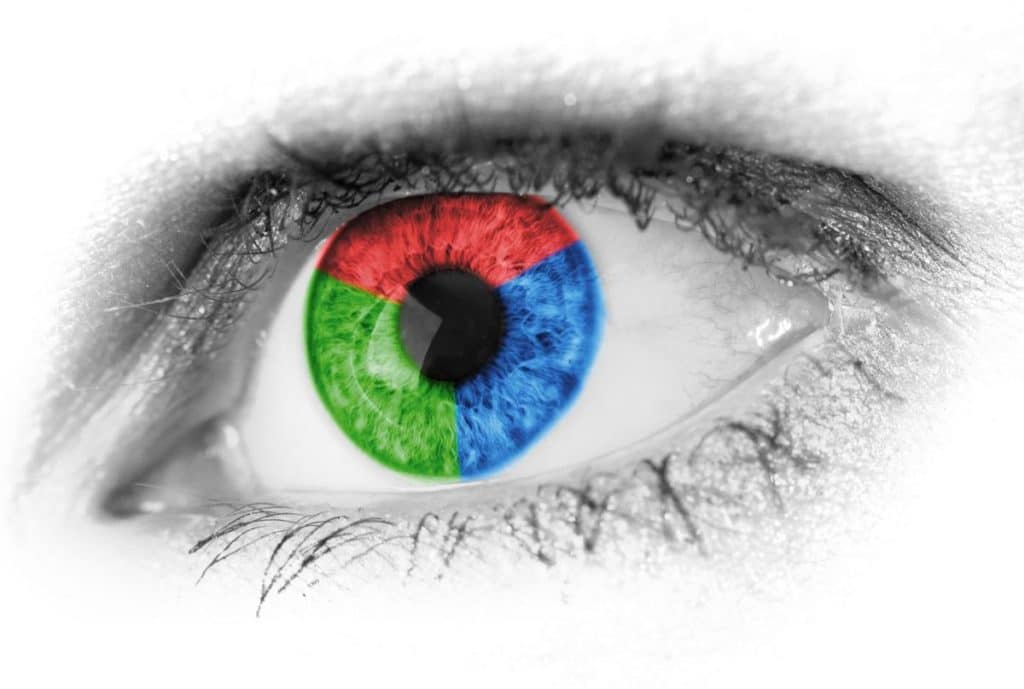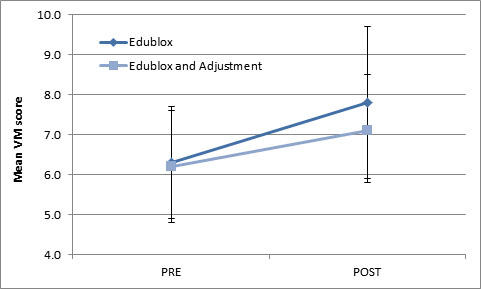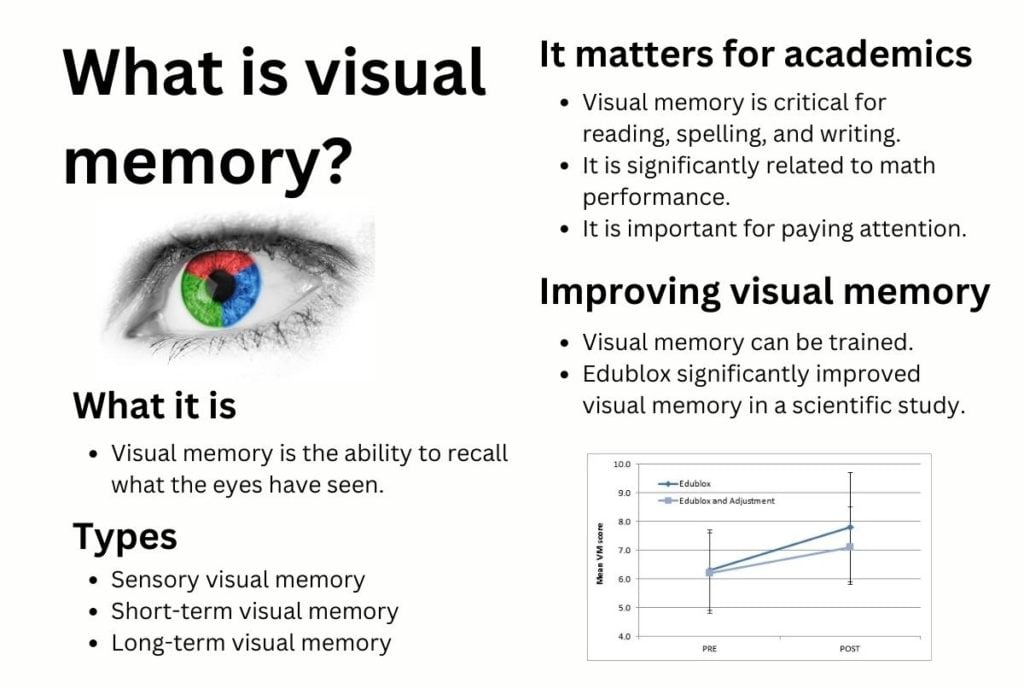
In 1969 Laszlo Virag was tried and initially convicted of being a person who had committed armed robberies in Liverpool and Bristol. He was convicted based on the testimony of several witnesses who picked him out of line-ups or identified him from photographs. One police witness claimed that “his face is imprinted in my brain.”
However, it transpired that another person, known as George Payen, was responsible for these crimes — someone who bore a passing but not striking resemblance to Mr. Virag. As a result, Mr. Virag was pardoned in 1974, having been the victim of a miscarriage of justice based on mistaken identity — and mistaken visual memory.
Table of contents:
- What is visual memory?
- Types of visual memory
- Visual memory matters for academics
- Visual memory can be trained
- Improving visual memory
- Key takeaways
What is visual memory?
Memory is the process by which knowledge is encoded, stored, and later retrieved. Although the word memory may conjure up an image of a singular, “all-or-none” process, it is clear that there are many kinds of memory, each of which may be somewhat independent of the others.
Visual memory involves storing and retrieving previously experienced visual sensations and perceptions when the stimuli that initially evoked them are no longer present. In short, visual memory is the ability to recall what the eyes have seen.
Types of visual memory
Researchers have subdivided visual memory into three main subsystems: sensory, short-term, and long-term memory.
– Sensory visual memory
Visual sensory memory – also named iconic memory — can easily be experienced by going into a dark room with a flash camera and taking a picture. Although the camera’s flashbulb will provide only a few milliseconds of illumination, the perception of the illuminated room will fade over a period of about half a second.
– Short-term visual memory
Visual short-term memory (STM) stores visual information for up to 30 seconds so that it can be used in the service of ongoing cognitive tasks. Compared with iconic memory representations, visual STM representations are longer-lasting, more abstract, and more durable.
Much evidence indicates that verbal STM and visual STM are different memory stores. Verbal STM involves recall for words and language-based items. Because they are distinct, brain damage can lead to a disruption of verbal STM without disruption of visual STM and vice versa. Also, it is possible to occupy verbal STM with one task without impacting visual STM for another task and vice versa.
Visual working memory (WM) is often used as a broader term and includes two different functions: visual STM and visual WM. Visual STM represents the storage aspect of memory, while visual WM describes the storage and manipulation of information held in memory.
– Long-term visual memory
Short-term memory for visual materials is highly limited in capacity, but visual long-term memory has no clear capacity limit. For example, after viewing 600 photographs of scenes and events, subjects recognized 92% of images when tested one day later and 63% when tested one year later. Such dramatic differences in capacity are vividly depicted in the titles of two widely cited articles, “Learning 10,000 Pictures” (Standing, 1973) and “The Magical Number 4 in Short-term Memory” (Cowan, 2001).
Visual memory matters for academics
Various researchers have stated that as much as 80 percent of all learning occurs through the eye, with visual memory being a crucial aspect of learning.
– Critical for reading, spelling, and writing
Visual memory is a critical factor in reading, spelling, and writing. Children who have not developed their visual memory skills cannot readily reproduce a sequence of visual stimuli. As a result, they frequently experience difficulty remembering the overall visual appearance of words or the letter sequence when reading and spelling. For example, they may remember the letters of a word but often cannot remember their order, or they may know the initial letter and configuration of the word without having absorbed the details, that is, the subsequent letters of the word. As a result, these children fail to develop a good sight vocabulary and frequently experience serious spelling difficulties.
It can be frustrating for one with a visual memory deficit to perform a handwriting or word copying exercise. Therefore, children with poor visual memory may have trouble copying letters, words, and sentences from a chalkboard or book. They may present with very slow handwriting, trouble forming letters, and mixing up letters or words within sentences. Producing written work on worksheets and tests may be difficult.
– Significantly related to math performance
One hundred seventy-one children, with a mean age of 10.08 years, participated in a study by Marjean Kulp and colleagues (2004). This study, conducted at the Ohio State University College of Optometry, was designed to determine whether or not performance on visual perception tests could predict children’s math achievement.
Visual perception refers to the process of interpreting and organizing visual information. Visual perception is often subdivided into visual discrimination and visual memory. Visual discrimination involves the ability to attend to and identify a figure’s distinguishing features and details, such as shape, orientation, color, and size.
Kulp et al. concluded: “Poor visual perceptual ability is significantly related to poor achievement in mathematics, even when controlling for verbal cognitive ability. Therefore, visual perceptual ability, and particularly visual memory, should be considered to be amongst the skills that are significantly related to mathematics achievement.”
A research study by Szűcs and his colleagues (2013) from the University of Cambridge, UK, set out to compare various potential theories of dyscalculia in more than a thousand 9-year-old children.
Dyscalculia is a severe math learning difficulty that affects roughly 6 percent of schoolchildren. These children have normal intelligence, and their reading skills may be perfect. Dyscalculia is often described as “like dyslexia, but for math.”
Szűcs et al. found that children with dyscalculia performed poorly on tasks that tap into visual-spatial memory. For example, they struggled when they had to remember the locations of items in a spatial grid.
– Important to paying attention
Lufi and Cohen (1985) compared the visual STM of 24 children with Attentional Deficit Disorder (ADD) with a control group of 17 children with emotional problems. The results showed that the control group performed significantly better than the ADD group, which confirms that visual STM plays a vital role in attention and concentration.
Although an essential cognitive ability for many intellectual tasks, the measurement of visual STM is usually not a part of the standard batteries that measure intelligence, aptitude, and achievement.
Visual memory can be trained

Kleinfeld (1973) tested the visual memory of 501 urban Caucasian and 125 village Eskimo children. Village Eskimo children demonstrated significantly higher levels of visual memory. Visual memory also significantly increased with age.
In contrast to the striking visual differences of the urban environment, the Arctic is a world of visual uniformity. The flat, monotonous tundra and piled sea ice provide few distinctive visual markers to guide the hunting on which survival in part depended. To hunt and find their way back to the village, Eskimos had to attend to tiny visual cues and their patterned relationships, such as upturned rocks or the angle of the Big Dipper at different times of the day. Caucasians, who had traveled with Eskimos, frequently remarked upon their extraordinary ability to travel through what seemed to be a featureless terrain by closely observing the smallest landmarks and memorizing their spatial locations.
Kleinfeld’s research clearly shows that visual memory can be trained!
Improving visual memory
Edublox Online Tutor (EOT) houses several multisensory cognitive training programs that enable students to overcome learning obstacles and reach their full potential.
EOT is founded on pedagogical research and 30+ years of experience demonstrating that weak underlying cognitive skills account for most learning difficulties. Underlying cognitive skills include visual memory. Specific cognitive exercises can strengthen these weaknesses leading to increased performance in reading, spelling, writing, math, and learning.
In one research study, Edublox improved visual memory by 1.3 years in 5 days. Chiropractor Dr. Jaidan Mays compared the effects of Edublox training versus Edublox training combined with cervical spinal manipulative therapy on visual memory and visual sequential memory.
Thirty-four Grade 5, 6, and 7 students from an inner-city school participated in Mays’s study. Two subtests of the Test of Visual Perceptual Skills were used to assess the students’ visual memory and visual sequential memory. The students were then divided into two equal groups.
The members of the first group (the Edublox Group) did Edublox for 22.5 hours over five days. The members of the second group (the Edublox and Adjustment Group) received the same Edublox training as the first group and also received cervical adjustment therapy every morning. The assessment was repeated after five days.
The results: The mean Visual Memory Skills Test POST score across both groups was significantly higher than the mean Visual Memory Skills Test PRE score. The mean score across both groups improved from 6.2 years to 7.5 years. As the graph below illustrates, the Edublox Group improved slightly more than the Edublox and Adjustment Group (an improvement from 6.3 to 7.8 years versus an improvement from 6.2 to 7.1 years):
.

.
EOT has been optimized for children between 7 and 13, is suitable for the gifted and less gifted, and can be used at home and school. The program effectively alleviates symptoms associated with dyslexia, dyscalculia, and dysgraphia.
..
Key takeaways

